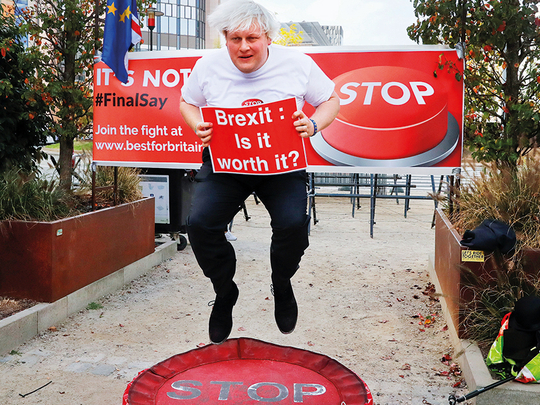
BRUSSELS: British Prime Minister Theresa May met with French President Emmanuel Macron in Brussels on Wednesday shortly before addressing fellow EU leaders on the stalled Brexit negotiations, her office said.
The meeting, on the sidelines of a European Union summit, had not previously been announced. May was also due to meet European Commission president Jean-Claude Juncker and EU Council president Donald Tusk.
However, Austrian Chancellor Sebastian Kurz says "the ball is in Great Britain's court" to come up with a way to break the logjam in Brexit talks.
Leaders of the European Union say Britain needs to offer new proposals on how to prevent a hard border between Ireland and Northern Ireland after the U.K. leaves the bloc in March. The issue has bedeviled negotiations and scuttled attempts to reach a divorce deal over the weekend.
Now both sides say a deal is still possible - in time.
Kurz, whose country holds the rotating EU presidency, said as he arrived for a summit in Brussels that "I hope that in the coming weeks and months we'll manage to conclude this Brexit."
He said British Prime Minister Theresa May needed to "make some adjustments" to her position and "if there's a small step in the right direction today I would judge that a success."
Meanwhile, May is to give a Brexit briefing to 150 chief executives on Friday, the Financial Times reported on Wednesday.
The call with the invited chief executives is unlikely to last more than half an hour and is due to begin at 4.30pm (1530 GMT), the Financial Times reported, citing people familiar with the proceedings.
The story did not provide names of the executives invited. A spokeswoman for Downing Street declined to give an immediate comment on the report.
European Union leaders will give British Prime Minister Theresa May a tough reception in Brussels on Wednesday, warning her to rally support at home for the Brexit deal on offer or be cut loose without one in March.
May will address the other 27 EU national leaders at a summit before they dine without her. Officials said they expected the leaders to tell May they have little more to offer since talks stalled on Sunday and will step up preparations for Britain to drop out of the bloc with no deal.
Summit chair Donald Tusk said the risk of a “no deal” taking Britain out of the bloc and into legal limbo and border chaos on March 29 was greater than ever.
He put the onus on May to bring a “creative” solution to break the impasse over the EU-UK land border on the island of Ireland.
The “no deal” message is sincere enough. It is also a tactic to pressure a negotiating partner the EU views as weak. And it might help May by giving her the kind of political theatre useful in persuading Britons she has fought for the best deal.
More subtly, leaders may also sound relaxed on the calendar for talks. On Tuesday, officials echoed the mantra that “the clock is ticking” to agree a treaty that parliaments can ratify in time for Brexit. But, sensing more urgency in London, senior EU officials said Brussels would “keep calm and carry on”.
The bloc’s Brexit negotiator Michel Barnier told ministers from the remaining 27 member states on Tuesday that December was “the ultimate deadline” for a deal with London to give both the European and UK parliaments time for ratification.
EU leaders meeting in Brussels on Wednesday are not expected to firmly commit to an extra Brexit summit in November, which they had earlier pencilled in case of an October breakthrough.
But a summit next month could be called at short notice if there is solid progress in negotiations between Brussels and London, diplomats and officials said, which the bloc does not expect before May gets her budget adopted in early November.
“If we have a deal on the withdrawal agreement, it will be November ... or early December,” Philippe Lamberts, an EU lawmaker dealing with Brexit said on Wednesday. “I do not expect the transition to end at the end of 2020.” “The transition period postpones the moment when the backstop will kick in.” After an intense week of talks, London on Sunday walked away from a deal in which the EU offered to extend the post-Brexit transition by a year until the end of 2021 in a way to make the emergency fix for the Irish border more palatable to Britain.
This “two-tier backstop” would keep Britain in the EU’s single market and customs union for longer, giving sides more time to work out a new trade deal that would maintain an open Irish border from then on.
The EU insists on guarantees that extensive border checks would not return on the island of Ireland regardless of how Brexit goes, something London is finding difficult to accept as it would include some trade barriers emerging inside the UK.
Germany’s Europe minister called on May to “take responsibility and be constructive”.
Tusk said EU leaders would need to believe that a deal is nearly done to hold a Brexit summit in November.
“There needs to be a much clearer, sharper messaging on the choice the UK faces,” one senior diplomat told fellow national envoys after talks broke down on Sunday. The EU had gone as far as it could to address May’s difficulties with her hardline pro-Brexit and Northern Irish allies, he said.
Quite how tough the EU message is to May after Wednesday’s dinner will depend on her approach, diplomats said. If she brings to Brussels the uncompromising tone they heard a month ago in Salzburg, then the EU warnings of impending calamity will step up.
EU chief executive Jean-Claude Juncker will tell leaders after May has spoken on Wednesday about his European Commission’s plans for a “no deal”. Officials say that will include how to rush through emergency EU legislation to cope with huge disruption to transport and trade links.












